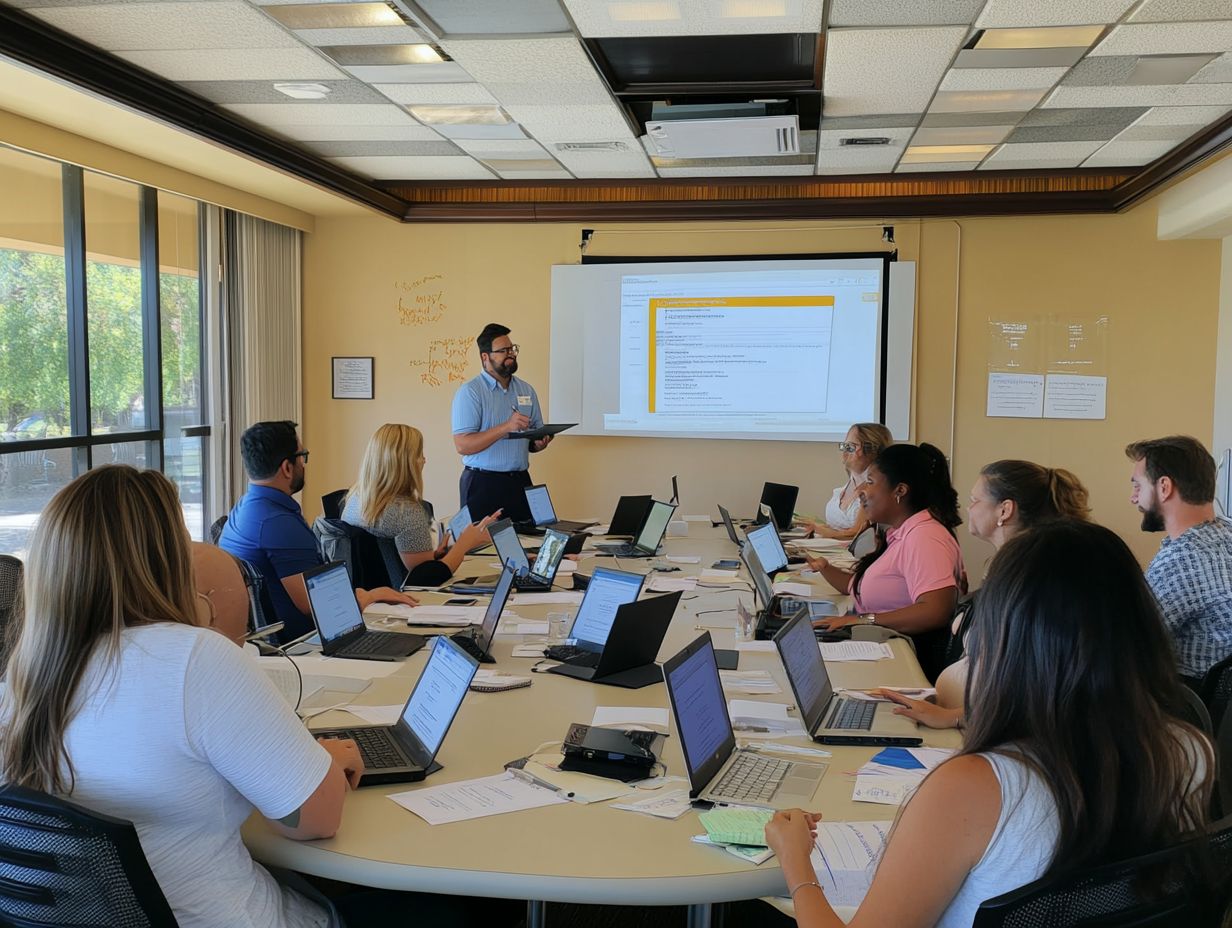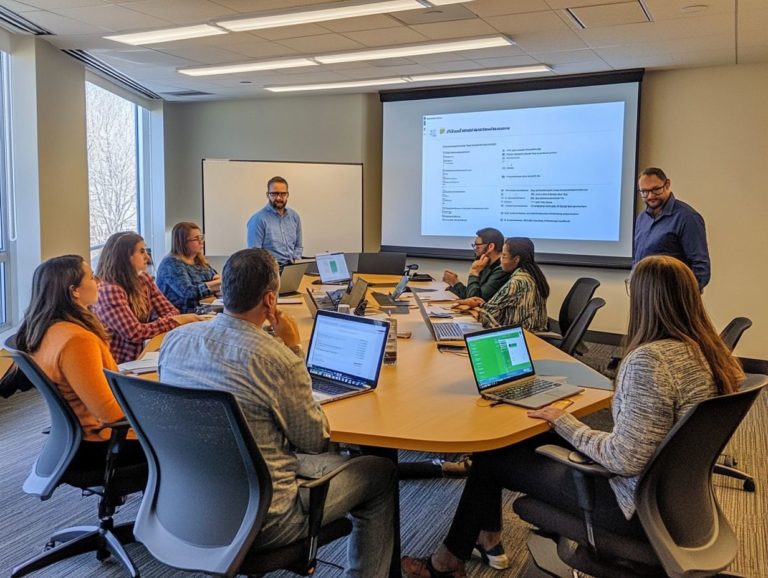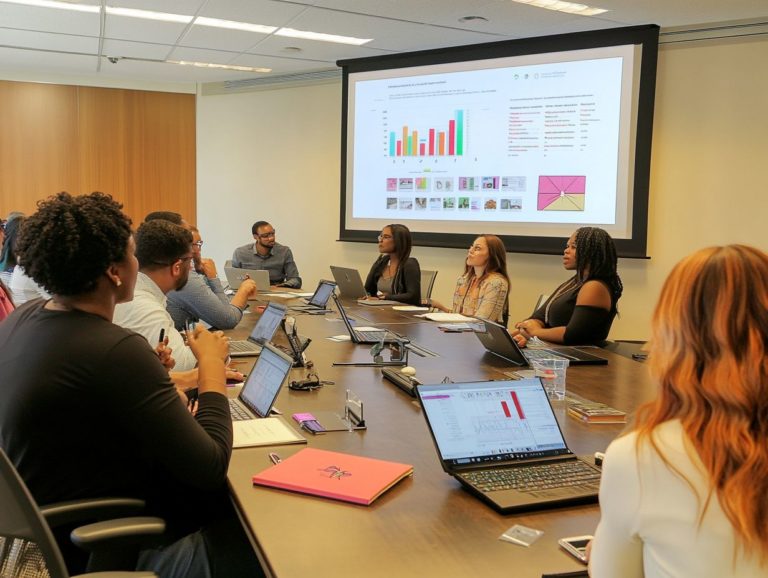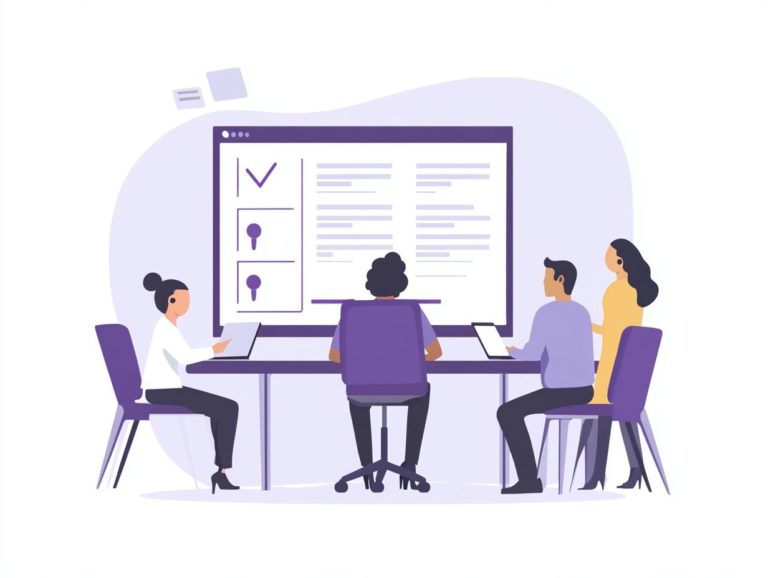“How to Create Interactive CRM Training Sessions”
In today s fast-paced business environment, mastering Customer Relationship Management (CRM) is essential for nurturing client relationships and fueling growth.
The secret to unlocking the full potential of CRM lies in thorough training.
This article delves into the importance of CRM training and offers a strategic roadmap for crafting engaging, interactive sessions.
From vital training components to innovative techniques such as role-playing and group discussions, you ll find everything necessary to elevate your team s CRM skills and enhance overall effectiveness.
Get ready to transform your CRM training experience like never before!
Contents
- Here are the key takeaways:
- Understanding the Importance of CRM Training
- Key Elements of Interactive CRM Training
- Designing an Effective CRM Training Session
- Implementing Interactive Techniques
- Evaluating and Improving Training Sessions
- Frequently Asked Questions
- What is the purpose of creating interactive CRM training sessions?
- How do you incorporate interactivity into CRM training sessions?
- What are some benefits of using interactive training for CRM?
- How can I make sure my interactive CRM training is effective?
- What are some key considerations when creating interactive CRM training sessions?
- How can I measure the success of my interactive CRM training sessions?
Here are the key takeaways:

Interactive CRM training is essential for the success of any CRM system.
Engaging content, real-life scenarios, and interactive tools are key elements of effective CRM training.
Designing a structured curriculum, implementing interactive techniques, and evaluating and improving sessions are crucial for a successful training program.
Understanding the Importance of CRM Training
Recognizing the significance of CRM training is essential for any organization seeking to elevate customer engagement and refine sales processes.
As businesses increasingly turn to cloud-based Customer Relationship Management (CRM) solutions, well-structured training programs become vital. These programs empower sales and marketing teams to harness customer data with confidence and precision.
By investing in thorough CRM training, you can equip your employees to drive meaningful business results and enhance overall performance metrics.
Why Training is Essential for CRM Success
Training is vital for your CRM success, as it boosts user adoption and ensures that sales professionals can fully leverage CRM features to glean valuable customer insights.
When you invest in comprehensive training, you not only become adept at navigating the system but also excel in maintaining high data quality. This proficiency encourages accurate data entry and timely feedback both essential for making informed decisions.
Continuous learning opportunities help you stay updated on best practices and new features. This commitment to training ultimately enhances user satisfaction, improves customer relationships, and leads to more strategic, data-driven decision-making throughout your organization.
Key Elements of Interactive CRM Training
Key elements of interactive CRM training include engaging content, hands-on experiences, and effective learning tools.
Together, these components ensure that you fully grasp the intricacies of CRM software, empowering you to navigate its complexities with confidence and ease.
Engaging Content and Activities
Engaging content and activities are essential in CRM training, as they create an immersive learning environment that helps you retain knowledge and apply it effectively to real-world CRM software scenarios.
By incorporating interactive tools like quizzes and polls, you can actively participate in your learning journey, significantly enhancing your retention of key concepts.
Videos that showcase real-life applications of CRM processes can simplify complex ideas, making them easier to digest and understand.
Well-crafted case studies offer practical examples, allowing you to visualize scenarios that closely mirror your own experiences.
These elements not only deepen your understanding of sales processes but also empower you to interact with customers more effectively, paving the way for stronger relationships and heightened satisfaction.
Real-life Scenarios and Examples
Incorporating real-life scenarios into your CRM training transforms the experience. This connection enhances your practical knowledge.
By simulating situations like handling customer complaints or navigating complex discussions, your training program can unveil valuable insights that purely theoretical lessons might overlook.
For example, engaging in role-playing exercises immerses you in the perspectives of both the sales representative and the customer. This sharpens your awareness of emotional cues and responses.
Case studies reflecting industry-specific challenges help you apply learned strategies in the workplace. This contextual approach not only bridges the gap between theory and practice but also gives you the power to make informed decisions with confidence. Ultimately, this leads to improved performance and heightened customer satisfaction.
Interactive Tools and Technologies

Utilizing interactive tools and technologies in your customer relationship management (CRM) training can dramatically enhance user adoption by offering hands-on experience with the software’s features.
These resources think simulations, mobile applications, and gamified training modules create immersive learning environments that engage you on multiple levels. By simulating real-world scenarios, you can practice using the CRM system without the pressure of making mistakes in a live setting.
Mobile apps provide the flexibility to learn on the go, making training accessible whenever and wherever you need it.
Gamified elements inject a sense of friendly competition and rewards, motivating you to complete training modules with enthusiasm. Don t miss out on the chance to enhance your skills! These tools prepare you for real-world CRM challenges.
Designing an Effective CRM Training Session
To design an effective CRM training session, establish clear learning objectives and craft a structured curriculum that aligns with the training needs of the participants. This approach makes the session exciting and relevant.
Identifying Learning Objectives
Identifying learning objectives is a crucial step in CRM training, laying the groundwork for achieving specific sales goals and enhancing employee engagement. When you understand what you aim to accomplish, it becomes significantly easier to align your activities with performance metrics that matter.
Clear objectives enable instructors to create tailored content that resonates with you, ultimately driving both motivation and commitment. These well-defined goals serve as a roadmap for trainers and participants, ensuring every session builds toward measurable results.
As organizations prioritize effective training, having clarity in objectives ensures that the right skills are developed. This helps maximize your return on investment and drives success within the sales team.
Creating a Structured Curriculum
Creating a structured curriculum for CRM training allows you to cover all essential topics systematically. This ensures effective learning and ongoing support throughout the process.
This comprehensive approach helps you grasp the intricacies of customer relationship management while keeping you engaged with the material. Enjoy diverse learning experiences that make understanding CRM a breeze!
Regular assessments are essential for measuring your understanding and progress, offering opportunities for constructive feedback.
Utilizing feedback mechanisms enables you to tailor the curriculum to better suit individual needs. Adaptability is key, allowing the curriculum to evolve alongside shifting business dynamics and technologies, ultimately cultivating a more competent and responsive workforce.
Implementing Interactive Techniques
By incorporating interactive techniques like role-playing, simulations, and group discussions into CRM training, you captivate participants and significantly enrich their learning experience. This approach transforms traditional training into a dynamic environment where engagement flourishes and knowledge retention deepens.
Role-playing and Simulations
Role-playing and simulations offer you valuable hands-on experience in CRM training. They allow you to navigate sales processes within a controlled environment.
These methods act as powerful tools for replicating real-world sales situations. They enable you to confront various challenges and customer interactions without the pressure of actual transactions.
By immersing yourself in these simulated scenarios, you can build your confidence, sharpen your communication skills, and explore different sales strategies.
This engaging approach fosters constructive feedback, helping you pinpoint areas for improvement. The insights you gain will not only elevate your individual performance but also contribute to a more effective overall sales strategy. This strategy is driven by a deeper understanding of customer needs and responses.
Group Discussions and Activities

Group discussions and activities elevate team collaboration and boost employee engagement during CRM training sessions. They provide you with the opportunity to share valuable insights and strategies.
This collaborative approach invites diverse perspectives and deepens your understanding of complex CRM data and customer insights.
Engaging in team-based case studies allows you to analyze real-life scenarios. This encourages collective brainstorming for innovative solutions.
Role-playing exercises enable you to step into various customer profiles. This expands your grasp of different consumer behaviors.
Collaborative workshops empower you and your teammates to co-create strategies. This enhances your ability to interpret data through a blend of expertise. Ultimately, this synergy fosters a richer learning experience and leads to more effective applications of CRM principles in your roles.
Online Quizzes and Games
Incorporating online quizzes and games into your CRM training will supercharge your learning experience and boost the effectiveness of the training sessions. Making the learning process more engaging is key.
When you immerse participants in a gamified environment, their motivation often skyrockets. This turns what could be stagnant learning into a dynamic, interactive experience. For instance, using quiz formats like Kahoot or Quizizz offers immediate feedback and ignites a competitive spirit among your team members.
Scenario-based games that mimic real-life customer interactions enable learners to apply concepts in a risk-free environment. This approach reinforces knowledge retention and nurtures essential skills such as problem-solving and critical thinking. Ultimately, this leads to enhanced performance in their roles.
Evaluating and Improving Training Sessions
Evaluating and enhancing training sessions is essential to make sure they meet your desired objectives and elevate the overall effectiveness of your CRM programs.
This careful approach refines the training experience and maximizes the impact on participant performance, driving tangible results in your organization.
Gathering Feedback and Making Adjustments
Gathering feedback from participants is essential for refining CRM training programs. This ensures that the training stays relevant and effective.
You can employ various methods to collect this invaluable input. Surveys allow participants to share their thoughts anonymously and efficiently. This makes it easy for you to gather insights without putting anyone on the spot.
Focus groups create a more interactive atmosphere. They encourage open dialogue about what elements of the training participants found beneficial or lacking.
You can use this feedback to shape future iterations of the training content and structure. By carefully analyzing participants’ insights, you can pinpoint knowledge gaps and adapt your materials to better align with their needs and preferences.
Ultimately, this approach enhances the overall learning experience and ensures that everyone walks away with the skills they need.
Measuring Training Effectiveness
Measuring the effectiveness of your training involves a careful analysis of performance metrics and user feedback to gauge the success of your CRM training programs. This process allows you to pinpoint specific important measures of success, such as sales conversion rates, customer satisfaction scores, and employee retention rates.
By leveraging these metrics, you can uncover insights into how well the new skills are being applied in real-world situations. Regularly assessing and adjusting your training programs based on ongoing measurements can significantly boost employee engagement and performance.
This iterative approach cultivates an environment of continuous improvement, ensuring that your training remains relevant and impactful in driving desired sales outcomes while enhancing overall morale.
Frequently Asked Questions
What is the purpose of creating interactive CRM training sessions?

Creating interactive CRM training sessions allows for a more engaging and effective learning experience for participants. It helps ensure that the training material is better understood and retained.
How do you incorporate interactivity into CRM training sessions?
Interactivity can be incorporated through various methods such as group discussions, role-playing, case studies, quizzes, and hands-on activities. These methods encourage active participation and enhance information retention.
What are some benefits of using interactive training for CRM?
Interactive training for CRM can lead to a better understanding of the CRM system and its features, improved problem-solving skills, and increased confidence when using the system. It also promotes team building and collaboration among participants.
How can I make sure my interactive CRM training is effective?
To ensure the effectiveness of your interactive CRM training, it is crucial to have clear learning objectives, well-structured content, and engaging activities. Gathering feedback from participants is essential for making necessary adjustments.
What are some key considerations when creating interactive CRM training sessions?
Knowing your audience is crucial for effective training! Consider their learning styles, determine the level of interactivity needed, and choose the appropriate tools and activities. A well-trained and knowledgeable facilitator is also vital.
How can I measure the success of my interactive CRM training sessions?
To measure the success of your interactive CRM training sessions, conduct post-training assessments and surveys to gather participant feedback. Tracking key performance indicators, such as increased system usage or improved customer satisfaction, can also indicate the effectiveness of the training.
In conclusion, creating engaging and interactive CRM training sessions is key to ensuring the material is understood and retained. By continually measuring effectiveness and seeking feedback, you can improve your training initiatives and ultimately drive better results.






